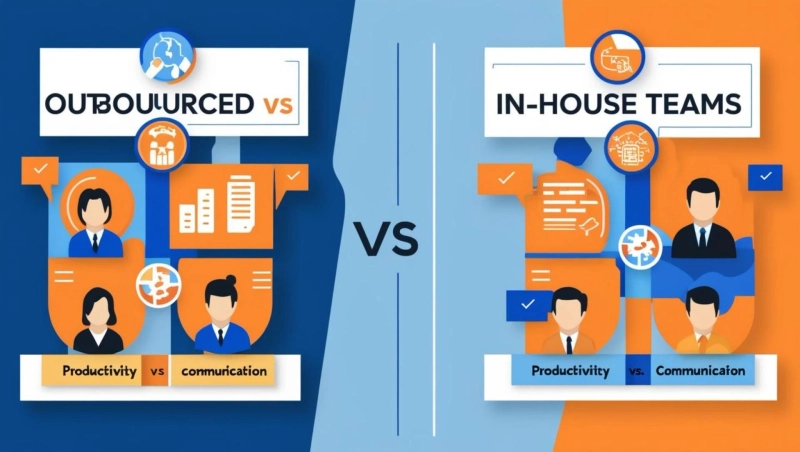Bookkeeping in 2025 isn’t just about balancing the books—it’s about staying competitive, efficient, and financially savvy. As more businesses shift their models, the debate heats up: Outsourced or in-house bookkeeping—who really wins?
Spoiler: there’s no one-size-fits-all answer. But with technology evolving fast and remote work becoming the norm, the playing field is definitely changing. Let’s dive into the battle and see who comes out on top.
What Is In-House Bookkeeping?
Definition and Setup
In-house bookkeeping means having an employee (or team) handle your financial records directly from within your company. They might be full-time, part-time, or even work on-site in your office.
Typical Responsibilities
They manage daily transactions, bank reconciliations, accounts payable/receivable, payroll, and financial reporting—often using accounting software you’ve chosen.
Who It Works Best For
This model works well for companies with complex, hands-on financial processes or those that prefer face-to-face collaboration.
What Is Outsourced Bookkeeping?
Definition and How It Works
Outsourced bookkeeping services for usa is when you hire a third-party service—usually remotely—to handle your financial operations. This could be an individual contractor or a dedicated team through a firm.
Popular Outsourced Models
Some offer flat-fee monthly packages, others charge hourly. Services range from basic data entry to full-scale accounting and virtual CFO services.
Who Benefits the Most
Startups, growing SMBs, and companies looking for flexibility, cost savings, and access to advanced tools often benefit most.
Cost Comparison: Dollars and Sense
Salary vs. Subscription
An in-house bookkeeper in the U.S. can cost between $45,000–$70,000 annually—plus benefits. Outsourced services? Typically between $200–$1,000/month depending on volume and complexity.
Hidden Costs of In-House Teams
Think equipment, office space, training, turnover, and payroll taxes. It adds up—fast.
ROI of Outsourcing
With outsourcing, you’re only paying for what you need, with little to no overhead. Plus, you get a team that’s already trained and ready to go.
Technology and Tools: Who Has the Edge?
Access to the Latest Platforms
Outsourced firms often use cutting-edge platforms like QuickBooks Online, Xero, and AI-backed apps as part of their service—no need for you to license them yourself.
Automation and AI Features
Outsourced services lead the charge in automation—auto-categorizing expenses, generating reports, and even detecting anomalies.
Scalability and Integration
Outsourced teams can plug directly into your CRM, POS, or project management tools, offering real-time data flow with zero hassle.
Flexibility and Availability
9-to-5 vs. 24/7 Access
In-house bookkeepers clock out. Outsourced services (especially global ones) offer around-the-clock support and access to dashboards anytime.
Adjusting to Business Growth
Need to scale quickly? Outsourced providers can upgrade your package in minutes—hiring a new in-house team takes weeks.
Handling Seasonality and Surges
Outsourcing is perfect for businesses with fluctuating volumes. You can ramp up or scale down without hiring or firing anyone.
Accuracy and Compliance
Risk of Human Error
Both models carry some risk, but outsourced services use checks, balances, and AI to minimize mistakes.
Keeping Up with Tax Laws
Top outsourced teams stay current with local, state, and federal regulations—so you don’t have to.
Audit Readiness
Most outsourced platforms offer ready-to-download reports, audit logs, and compliance features for peace of mind.
Security and Data Privacy
In-House Control vs. Outsourced Safeguards
Some prefer the perceived control of in-house systems. But outsourced firms invest heavily in security—often more than SMBs can afford in-house.
Encryption, Backups, and Certifications
Outsourced platforms often feature bank-level encryption, daily backups, and SOC 2 compliance.
Talent and Expertise
Finding Qualified Bookkeepers Locally
It can be tough—and expensive—to recruit top-tier talent in-house.
Outsourced Access to Specialists
Outsourced teams are often composed of industry specialists who handle everything from real estate to e-commerce bookkeeping.
Training and Upskilling Burdens
In-house staff require ongoing training, which you pay for. Outsourced firms handle that on their end.
Collaboration and Communication
Working with Internal Teams
Face-to-face communication can be smoother with in-house staff. They’re immersed in your culture and operations.
Communication Challenges with Outsourced Providers
Delays and miscommunication can happen with remote teams, but most top firms offer dedicated account managers to bridge the gap.
Hybrid Models as a Compromise
Some businesses use a blend: an in-house controller working with outsourced bookkeepers—best of both worlds.
Business Size and Stage: What Fits Best?
Solopreneurs and Startups
Outsourcing wins here—affordable, no-hassle, and scalable.
Growing SMBs
Outsourcing still leads, especially when resources are tight, and focus needs to stay on growth.
Large Enterprises
In-house may regain the edge for companies that need deep, custom workflows and full-time financial staff.
Real-World Use Cases
Companies Winning with Outsourced Bookkeeping
A California startup slashed admin time by 60% with Bench.
An East Coast digital agency boosted financial accuracy using Bookkeeper360.
Companies Thriving with In-House Teams
A national retail chain built a 10-person finance department to manage complex multi-state operations efficiently.
What Business Owners Are Saying in 2025
Survey Data and Feedback
In a 2025 survey, 67% of SMBs said they preferred outsourcing due to flexibility, cost, and ease of use.
Key Deciding Factors
The top three? Cost savings, access to expertise, and time freedom.
Final Verdict: Who Wins in 2025?
It Depends on Your Goals
There’s no universal answer. Your size, industry, and growth stage all play a role.
Trends That Favor Outsourcing
With automation, AI, and remote work reshaping business, outsourcing is gaining major ground.
The Future of Bookkeeping Strategy
Hybrid models may dominate—where in-house teams manage strategy, and outsourced services handle execution.
Conclusion
In the battle of outsourced vs. in-house bookkeeping, the real winner is the business that understands its needs, goals, and resources. In Finslog Outsourcing offers flexibility, lower costs, and cutting-edge tech. In-house provides control and deep integration. Choose the model that supports your growth—and don’t be afraid to blend both.


